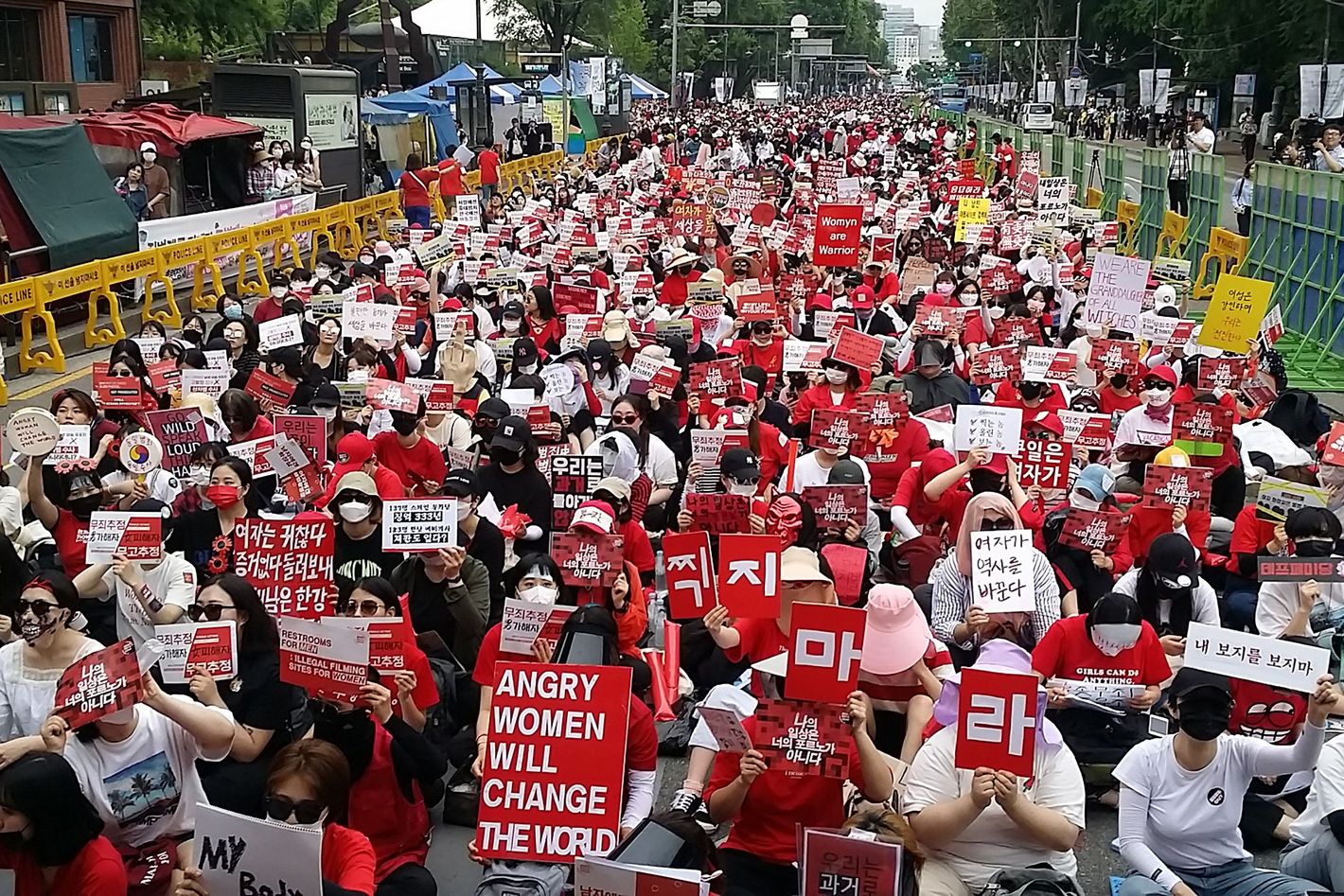
Donald Trump is heading back to the White House, and the men who voted for him overwhelmingly are feeling triumphant. Following a blatantly misogynistic campaign, videos are now circulating of frat bros reveling in Trump’s victory over Kamala Harris or referring to women as “property.” Far-right influencers like Nick Fuentes and Andrew Tate have been having a field day, posting slogans like “Your body, my choice” and celebrating having an accused rapist as a president.
Meanwhile, many women are feeling fearful not only about the increasingly violent strains of sexism Trump’s win has already emboldened, but about diminishing access to reproductive rights in this country. Project 2025, the slate of proposals Trump is widely suspected to pursue, includes prosecuting people who send abortion pills through the mail, tracking abortion seekers, and blocking federal funding for abortion care.
Given all of that, it’s not surprising that interest in the 4B movement — a loose coalition of feminists in South Korea who reject the country’s oppressive patriarchal values by opting out of heterosexual relationships and childbirth — has spiked. While some women see Trump’s victory as validation for their already-in-progress celibacy journeys, others are expressing newfound interest in the 4B movement specifically. A few have even shaved their heads, a hallmark of the South Korean movement’s origins, on-camera. But what exactly is the 4B movement, and how did it make its way to America?
4B started in South Korea as a response to widespread misogyny.
Though it’s difficult to pinpoint exactly when the 4B movement started, it reportedly emerged sometime around 2015 or 2016, along with other movements that pushed back against what participants saw as a patriarchal culture in South Korea. According to the Cut’s Anna Louise Sussman, the circumstances that gave birth to it included the rise of a misogynistic, anti-feminist community, called “Ilbe,” that painted women as gold diggers who were asking for more rights than they deserved, combined with a government fixated on encouraging women to have more babies. (Sound familiar?) The 4B movement was also a response to ongoing violence against women in South Korea — a 2016 survey found that the incidence of intimate-partner violence was over 10 percentage points higher than the global average.
Some women who identify with the 4B movement shave their heads, sometimes in videos that they then post online, as a rejection of Korean beauty ideals. Many of them lean into the ethos, distancing themselves from male friends and even female friends whose lives revolve around men. The goal, women who identify with it say, is not to change men, who they see as past redemption. They hope to change society by demonstrating a different, more empowering way of life to women — and also, as one participant told the Cut last year, to “eliminate the risks that come from heterosexual marriage or dating.” You can read more about the 4B movement here.
In the wake of the election, American women have been posting about the 4B movement.
American women have already spent the past few years talking about celibacy more. This week, the long-simmering discourse around decentering men turned into a sudden influx of videos and Google searches about the 4B movement, responding directly to Trump’s election and the legions of outspoken misogynists in his corner.
If you want to know where young American women are at, the Google search term interest for the 4b movement says it all. (It’s a South Korean term for women who swear off sex, marriage and childbirth with men) pic.twitter.com/qKZCiHIqrX
— Jessica Valenti (@JessicaValenti) November 6, 2024
>WHAT IS THE 4B MOVEMENT?
“A world without men”
The 4b movement is a protest against the patriarchy where
-you abstain from sex with men as a woman
-you abstain from childbirth
-you abstain from marriage
-you abstain from romanceIf they want to take over your bodies,
— Enzophoria (@enzophoria) November 6, 2024
One TikTok user in South Korea posted a video welcoming “U.S. sisters” and explaining the movement and its newer branches — 5B, 6B, and 7B — which include helping other 4B women who’ve been financially affected by cutting men out of their lives, boycotting companies with “pink taxes,” and “not giving emotional labor to men.”
In response, far-right men have only doubled down on terrifying comments.
As in South Korea, where women whose short hair indicates their identification with the 4B movement are often harassed and threatened, the far-right reaction to interest from women in the U.S. has only reinforced the notion that openly violent misogyny is on the rise. Seeing women online talking about celibacy in response to the election, streamer Jon Miller tweeted, “women threatening sex strikes like LMAO as if you have a say.”
Far-right influencer Tate, whose fans have proudly dubbed him the “king of toxic masculinity,” retweeted a definition of the 4B movement, writing, “24 hours and Trump has stopped hoes being hoes. Now you don’t even need abortions! Well done, Mr. President!”
The spike in interest — and particularly the shaved heads — has also elicited derision from conservative women, some of whom have joked that this makes them want to have more children. Couldn’t be me.
Related
Leave a comment
You must be logged in to post a comment.